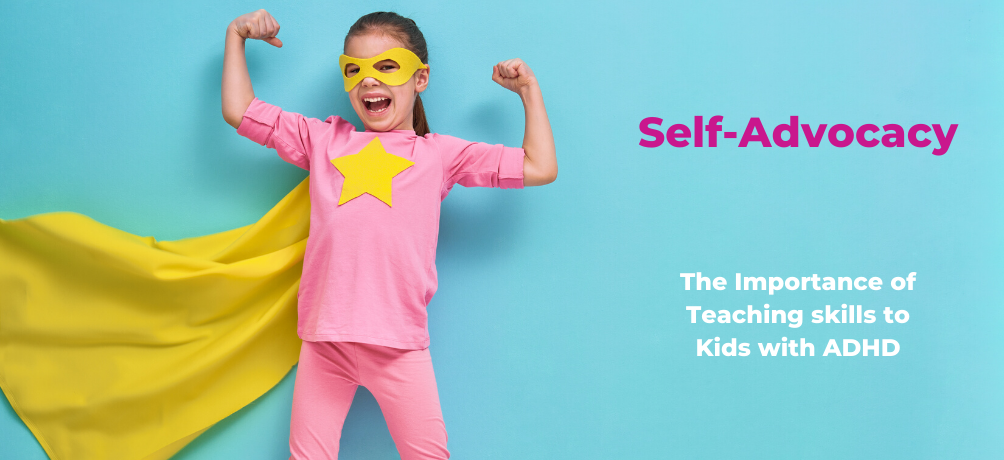The Importance of Teaching Self-Advocacy Skills to Kids with ADHD
By Dr. Mary Rooney, Ph.D.
As a parent of a child with ADHD, you spent a great deal of amount of time advocating for your child. You repeatedly explain your child’s ADHD symptoms to teachers, coaches, doctors, and even family members and friends, and work hard to learn about and seek the best treatments and supports to meet your child’s medical, academic, and social needs. This is no small task, especially since ADHD is often misunderstood (even by professionals). While you are able to be the one advocating for your child right now there will be a time when they need to take on this role themselves. We now know that ADHD is not typically something that kids outgrow, and this advocacy will need to continue throughout their lives. It is never too early to start preparing your child for the transition to adulthood by helping them develop the skills they will need to advocate for themselves.
Self-advocacy skills aren’t something that kids and teens are able to learn on their own, they are skills that need to be taught and practiced over time. Unfortunately, too many young adults with ADHD have not developed these skills and are now struggling to live independently. Without self-advocacy skills, young adults with ADHD are at risk for delaying important milestones or failing to achieve them altogether. This includes things like successfully completing college or holding down a full-time job, establishing meaningful adult friendships and a sense of belonging, moving out of their parents’ homes, and participating in activities that interest them and add meaning to their lives. In fact, research has demonstrated a clear link between teaching kids self-advocacy skills and their ability to become happy, well-functioning adults.
So, what is self-advocacy exactly? Self-advocacy can be broken down into three parts: (1) knowing yourself, (2) knowing what you need, and (3) knowing how to get what you need. Knowing yourself means knowing your strengths and weaknesses, understanding how your ADHD symptoms affect you and being aware of the things that bring you the most joy and the most frustration. Knowing what you need means understanding the kinds of accommodations, supports, and treatments that are most helpful for managing your ADHD symptoms. It also means being able to set a goal for yourself and identify the strategies, supports, and people who can help you achieve that goal. Knowing how to get what you need means knowing when and who to talk to about getting the help you need, being able to clearly communicate your needs, and being able to follow through consistently on treatment and support recommendations.
Self-advocacy is a complex process, which is why all parents should start teaching these skills to their children as early as possible. It’s not feasible to tackle every aspect of self-advocacy at once. Instead, start with knowing yourself. Help your child understand how their ADHD symptoms affect them on a daily basis and the things that make their symptoms better. Also, help them discover their strengths and interests by providing opportunities for participation in a variety of activities. Knowing what you need and knowing how to get what you need are things that should also be learned through experiences over time. In elementary school these experiences can include having your child attend IEP meetings or other parent-teacher meetings when appropriate, encouraging your child to take the lead on describing their symptoms and difficulties during doctor’s appointments (with parents filling in the gaps as needed), and coaching your child on how to ask their teachers for help when they are struggling.
Learning self-advocacy skills takes time and practice. Start small and provide plenty of coaching and praise as your child practices their new skills. Over time you’ll be helping your child grow into a confident adult with the self-advocacy skills that they need to live happily and successfully with ADHD.
ABOUT DR. MARY ROONEY
Mary Rooney, Ph.D., is a licensed clinical psychologist in the Department of Psychiatry at the University of California San Francisco. Dr Rooney is a researcher and clinician specializing in the evaluation and treatment of ADHD and co-occurring behavioral, anxiety, and mood disorders. A strong advocate for those with attention and behavior problems, Dr. Rooney is committed to developing and providing comprehensive, cutting edge treatments tailored to meet the unique needs of each child and adolescent. Dr. Rooney's clinical interventions and research avenues emphasize working closely with parents and teachers to create supportive, structured home and school environments that enable children and adolescents to reach their full potential. In addition, Dr. Rooney serves as a consultant and ADHD expert to Huntington Learning Centers.
ABOUT HUNTINGTON
Huntington Learning Center is the tutoring and test prep leader. Its certified tutors provide individualized instruction in reading, phonics, writing, study skills, elementary and middle school math, Algebra through Calculus, Chemistry, and other sciences. It preps for the SAT and ACT, as well as state and standardized exams. Huntington programs develop the skills, confidence, and motivation to help students of all levels succeed and meet the needs of Common Core State Standards. Founded in 1977, Huntington's mission is to give every student the best education possible. Call us today at 1.800.CAN LEARN to discuss how Huntington can help your child. For franchise opportunities please visit www.huntingtonfranchise.com.
This website does not provide medical advice, diagnosis, or treatment. The material on this site is provided for educational purposes only.

